Table of Contents
Get Custom eCommerce Fulfillment Service
Book a Meeting
Top 10 Crowdfunding Platforms, Pors and Cons
Time: Dec 26,2024 Author: SFC Source: www.sendfromchina.com
Crowdfunding has become one of the most popular ways to raise money, whether for a new business, a creative project, or a charitable cause. The right crowdfunding platform can connect you with thousands of potential backers, turning your dreams into reality. However, not all platforms are the same, and choosing the right one is key to your campaign's success.In this blog, we'll break down the top 10 crowdfunding platforms you should consider in 2024, detailing their strengths, weaknesses, and the type of campaigns they excel in. Whether you're looking for rewards-based crowdfunding, equity crowdfunding, or donation-based fundraising, we've got you covered!
1. Kickstarter
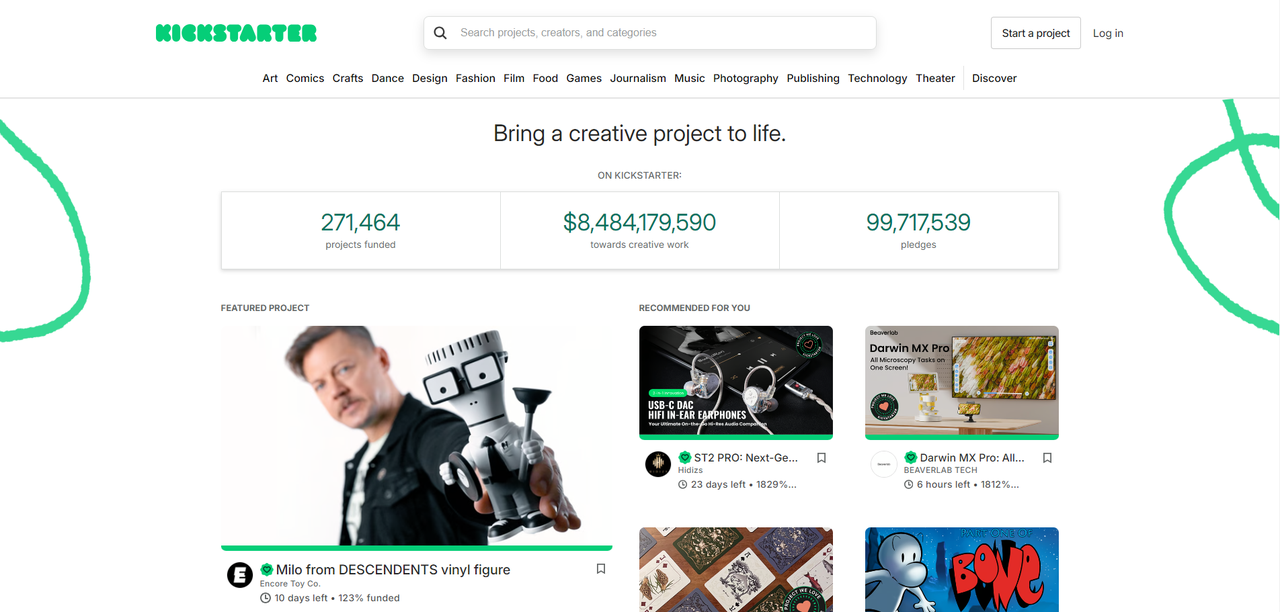
If you've ever thought about launching a new gadget, game, film, or music album, you've probably heard of Kickstarter. Known for its high visibility and success rates, Kickstarter is one of the biggest crowdfunding platforms in the world. It allows creators to raise funds for creative projects by offering rewards in exchange for contributions.
Pros
- Huge audience of backers- Flexible reward-based funding model
- Trusted platform with a solid reputation
Cons
- All-or-nothing funding model (if you don’t reach your goal, you don’t get any funds)- High fees (5% platform fee, plus payment processing fees)
Best for: Entrepreneurs, artists, filmmakers, designers, and game developers.
2. Indiegogo
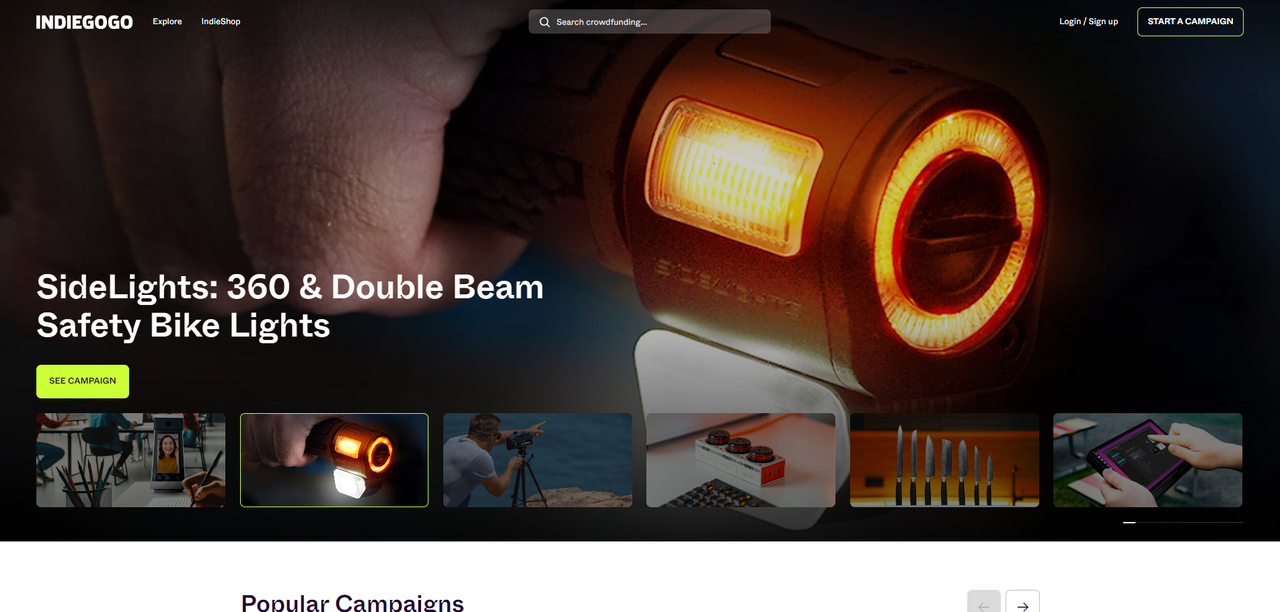
Indiegogo is another major crowdfunding platform that's slightly more flexible than Kickstarter. While it offers rewards-based funding like Kickstarter, Indiegogo also allows equity crowdfunding for startups, making it appealing for entrepreneurs and small businesses. It also provides an option for flexible funding, meaning you can still keep the money you raise, even if you don’t hit your goal.
Pros
- Flexible funding options (fixed and flexible)- A wide variety of project categories
- Global reach with international backers
Cons
- Like Kickstarter, you may face high fees, depending on the funding model- Less prestigious than Kickstarter in certain circles
Best for: Product launches, creative projects, startups, and charity campaigns.
3. Gamefound
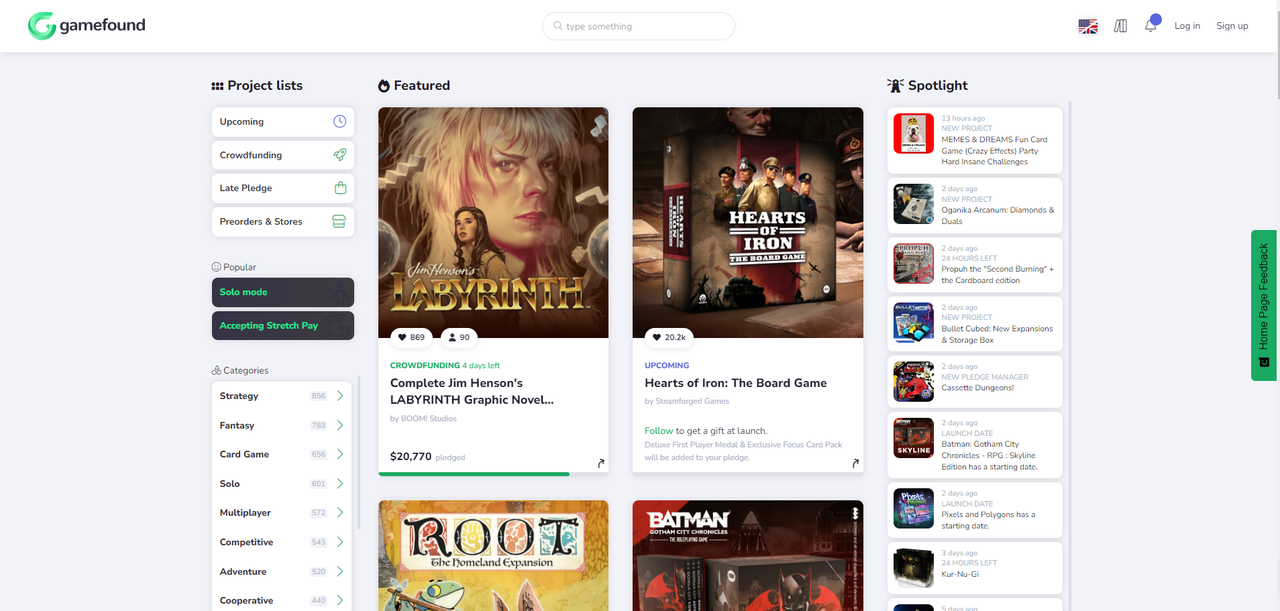
If you’re creating a tabletop or board game, Gamefound is the go-to platform for crowdfunding your project. Unlike Kickstarter or Indiegogo, Gamefound focuses exclusively on the board gaming industry, making it a niche platform with a highly targeted audience of passionate backers.
What sets Gamefound apart is its toolset for project management, which helps creators handle production, logistics, and fulfillment. Additionally, Gamefound offers integrations for stretch goals and add-ons, making it easier to engage with backers and upsell during the campaign.
Pros
- Niche platform catering to board game creators- Built-in project management and pledge management tools
- Highly engaged, targeted audience
Cons
- Limited to board games and tabletop projects- Smaller audience compared to platforms like Kickstarter
Best for: Game developers, designers, and companies in the tabletop gaming space.
4. Fundable
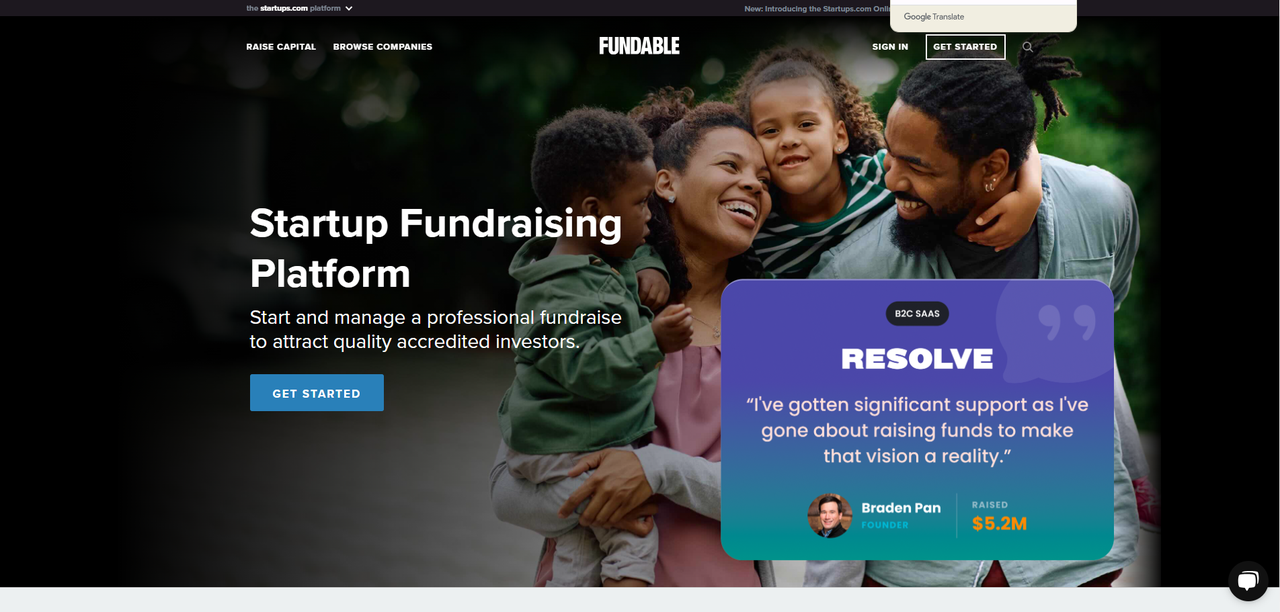
Fundable offers both rewards-based and equity crowdfunding, making it an excellent choice for startups that want to choose the right model for their needs. Unlike Kickstarter, Fundable allows entrepreneurs to offer equity in exchange for investment.
Pros
- Both rewards-based and equity crowdfunding- Flexible funding options
- Great for startups and small businesses
Cons
- Charges monthly fees (even if you don't raise funds)- Not as widely recognized as Kickstarter or Indiegogo
Best for: Startups seeking flexible funding options.
5. Crowdfunder

Crowdfunder is one of the UK's leading crowdfunding platforms, offering a space for both individuals and organizations to raise money for their ideas. The platform specializes in supporting community projects, small businesses, charities, and non-profits, but it also allows you to fundraise for personal causes or entrepreneurial ventures.
What makes Crowdfunder unique is its partnership with companies like PayPal and various local councils, which often provide match funding or additional financial support to eligible campaigns. Crowdfunder also encourages socially impactful projects, which aligns well with non-profits and sustainability-driven organizations.
Pros
- Access to potential match funding from local councils or partners- Focus on socially impactful campaigns
- Great for small businesses and non-profits
Cons
- Limited primarily to UK-based campaigns- Smaller audience compared to global platforms like Kickstarter
Best for: Charities, local community initiatives, sustainability projects, and small businesses in the UK.
6. Patreon

Patreon is an excellent platform for creators, artists, and influencers who want to build a community of paying fans. Unlike one-off campaigns on Kickstarter, Patreon offers a subscription model, allowing backers to pledge a certain amount of money each month in exchange for exclusive content, early access, or other perks.
Pros
- Recurring revenue model (monthly payments)- Strong community-building features
- Great for ongoing content creators (YouTubers, podcasters, artists)
Cons
- Less suited for one-time projects- Fees can add up depending on your subscription tier
Best for: YouTubers, podcasters, artists, musicians, and influencers.
7. Crowdcube

If you're based in the UK and are seeking equity funding, Crowdcube is one of the best options. It connects businesses with investors who are looking to buy equity in exchange for investment. Crowdcube is one of the largest and most reputable equity crowdfunding platforms in the UK.
Pros
- Popular for raising capital in the UK- Attracts a wide range of investors
- Great for startups and businesses looking to scale
Cons
- Restricted to UK-based businesses- Requires a detailed business plan and pitch
Best for: UK-based businesses seeking equity investment.
8. GoFoundMe
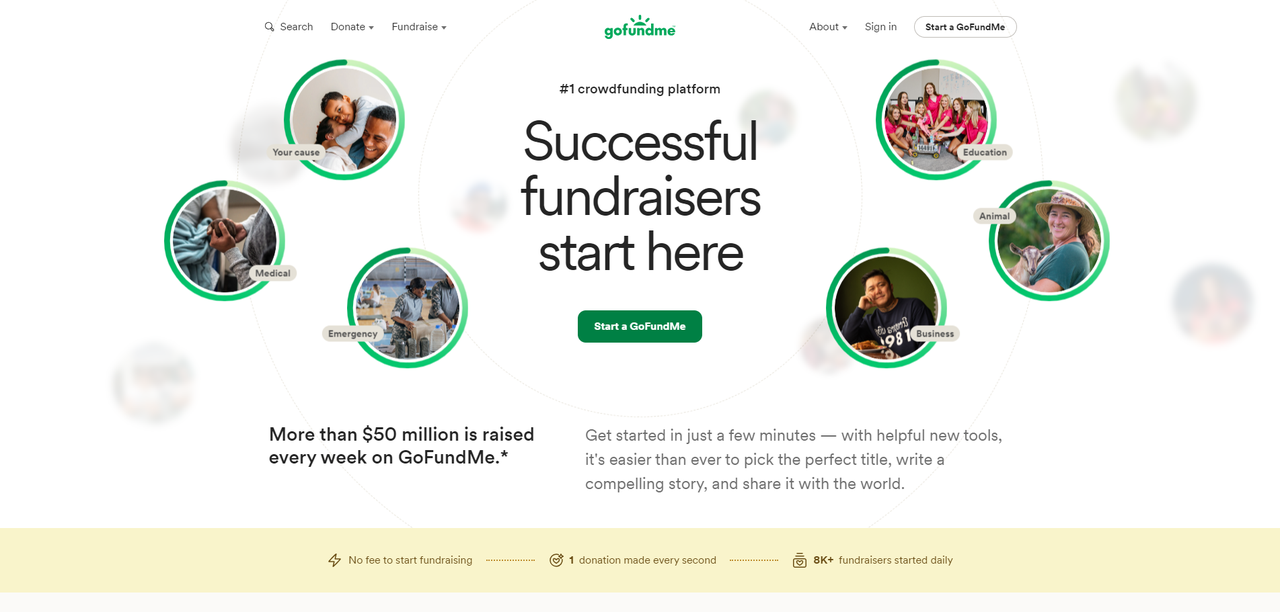
Unlike Kickstarter and Indiegogo, GoFundMe is more focused on personal causes, medical expenses, and charity fundraising. It’s an ideal platform if you’re looking to fundraise for a personal emergency, medical treatment, or a community project.
Pros
- No platform fee for personal causes- Easy to set up and share
- Ideal for personal fundraising and charity campaigns
Cons
- Less suited for business or creative projects- Lacks the exposure that platforms like Kickstarter offer for business ventures
Best for: Individuals raising money for personal causes or non-profits.
9. Mightycause
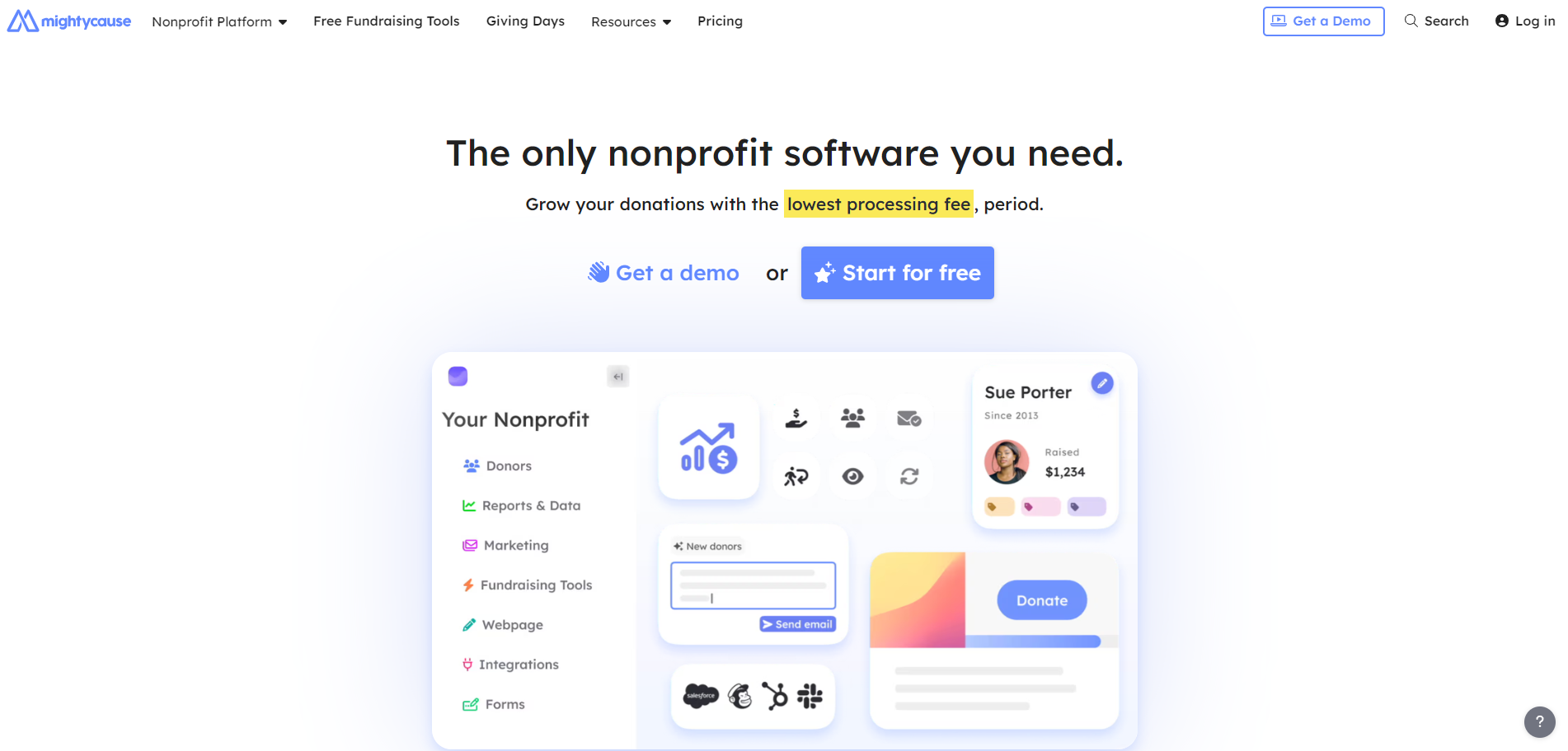
If you’re a non-profit organization or hosting a charity fundraiser, Mightycause is a fantastic platform to consider. Formerly known as Razoo, Mightycause specializes in helping non-profits and individuals raise funds for causes that matter. It offers tools for peer-to-peer fundraising, team fundraising, and event management, making it a versatile choice for organizations looking to create impactful campaigns.
Mightycause also shines with its affordable pricing structure, allowing smaller non-profits to use the platform effectively without being burdened by high fees. It’s a particularly strong choice for Giving Days, large-scale fundraising events, and donor management.
Pros
- Ideal for non-profits and charities- Peer-to-peer and team fundraising tools
- Affordable pricing and donor management features
Cons
- Not suitable for business or product-based campaigns- Limited global reach (focused mainly in the U.S.)
Best for: Non-profits, charity fundraisers, and event-based fundraising efforts.
10. CrowdStreet
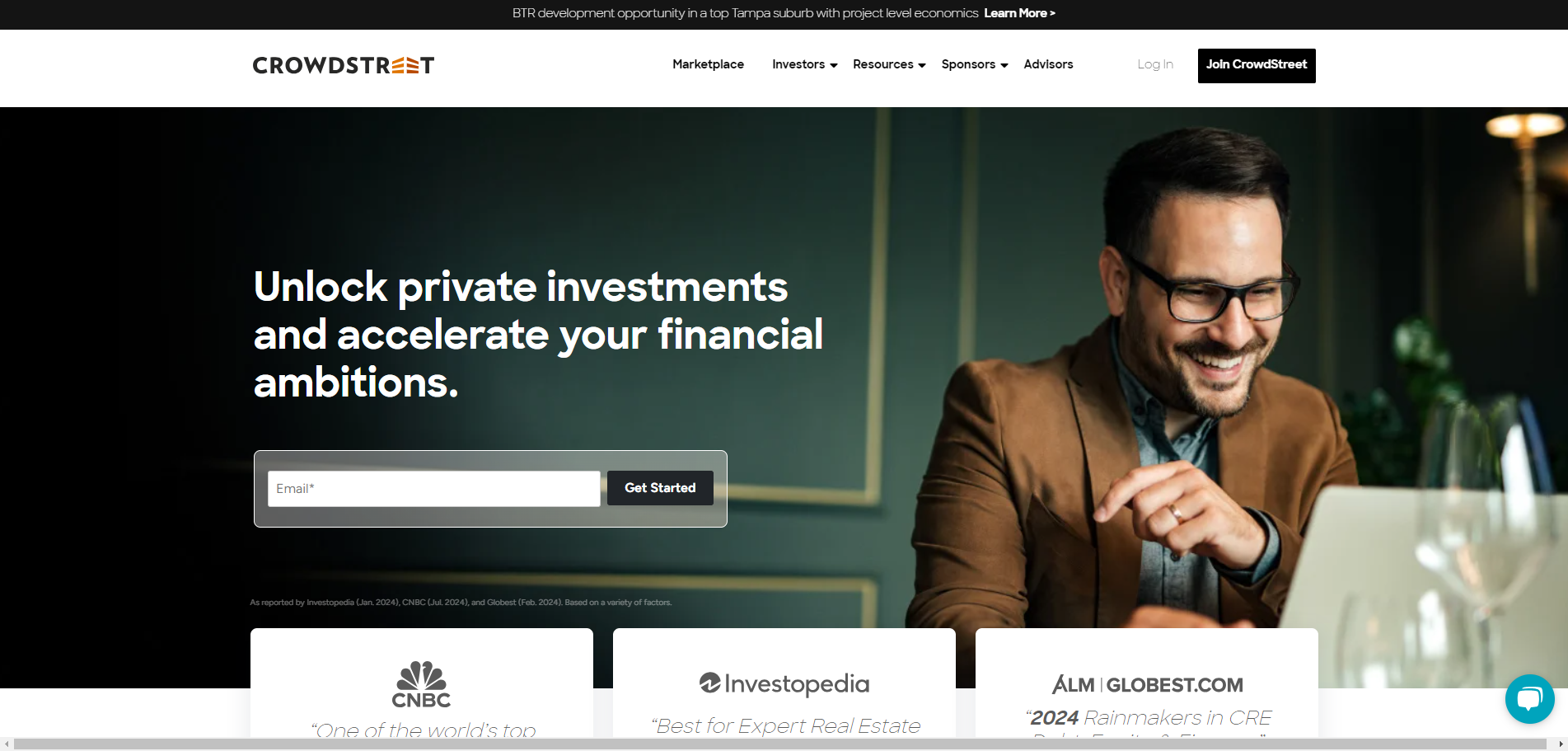
CrowdStreet is a leading platform for real estate crowdfunding, designed for accredited investors who want to invest in high-quality real estate opportunities. CrowdStreet connects investors directly with real estate developers, sponsors, and operators, allowing them to diversify their portfolios through real estate.
Unlike traditional crowdfunding platforms, CrowdStreet is focused solely on commercial real estate investments, offering access to individual projects, funds, and customized portfolios. The platform provides detailed project information, including financials and risk analyses, ensuring that investors have all the tools they need to make informed decisions.
Pros
- Tailored exclusively for real estate investment opportunities- Provides access to high-quality commercial real estate projects
- Transparency in investment details and financials
- Strong tools for portfolio diversification
Cons
- Requires investors to be accredited (limits accessibility)- High minimum investment amounts for most projects
Best for: Accredited investors looking to diversify their portfolios through real estate crowdfunding.
11. FAQs
What is the best crowdfunding platform for creative projects?
Kickstarter and Indiegogo are the most popular platforms for creative projects like music, film, and art.Can I use GoFundMe for business purposes?
GoFundMe is more focused on personal and charitable causes, so it’s not ideal for business-related campaigns.How much do crowdfunding platforms charge in fees?
Most platforms charge a fee between 5-10% for successful campaigns, plus payment processing fees.Can I raise equity through crowdfunding?
Yes, platforms like SeedInvest and Crowdcube allow you to offer equity in exchange for investment in your startup. Post Views:8746
Post Views:8746
Copyright statement: The copyright of this article belongs to the original author. Please indicate the source for reprinting.
Previous Post
What Is Fulfillment Status? The Definitions, Means, and Impacts
Next Post
TAGS
Hot Research
Get Custom eCommerce Fulfillment Service
Book a Meeting
Get a Custom China Fulfillment Solution with FREE Storage for 30 Days
 Want to know about our services, fees or receive a custom quote?
Want to know about our services, fees or receive a custom quote?
 Please fill out the form on the right and we will get back to you within a business day.
Please fill out the form on the right and we will get back to you within a business day.
 The more information you provide, the better our initial response
will be.
The more information you provide, the better our initial response
will be.





 TAGS:
TAGS: